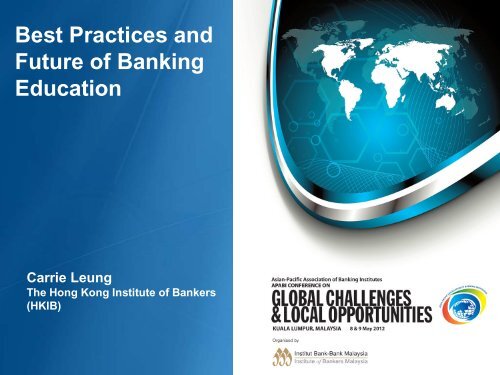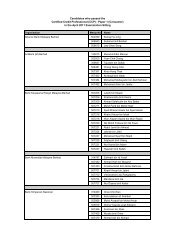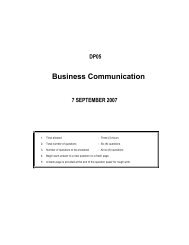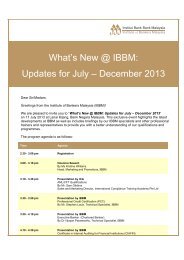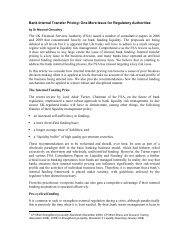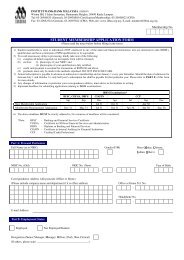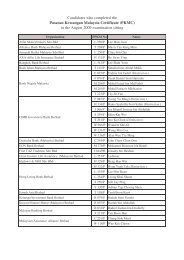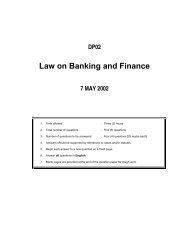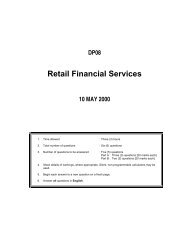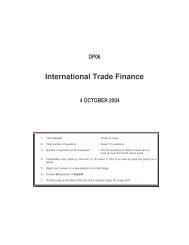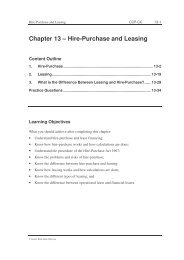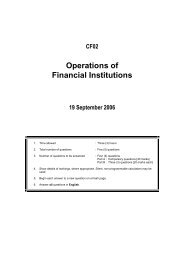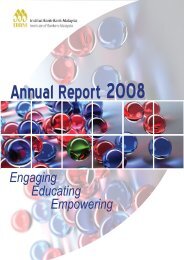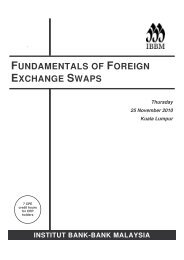Future of Banking Education - Institute of Bankers Malaysia
Future of Banking Education - Institute of Bankers Malaysia
Future of Banking Education - Institute of Bankers Malaysia
Create successful ePaper yourself
Turn your PDF publications into a flip-book with our unique Google optimized e-Paper software.
Best Practices and<br />
<strong>Future</strong> <strong>of</strong> <strong>Banking</strong><br />
<strong>Education</strong><br />
Carrie Leung<br />
The Hong Kong <strong>Institute</strong> <strong>of</strong> <strong>Bankers</strong><br />
(HKIB)
Agenda<br />
1. Background <strong>of</strong> the Hong Kong <strong>Institute</strong> <strong>of</strong> <strong>Bankers</strong><br />
(HKIB)<br />
2. Current Landscape <strong>of</strong> Hong Kong <strong>Banking</strong> Industry<br />
3. <strong>Future</strong> <strong>of</strong> <strong>Banking</strong> <strong>Education</strong><br />
Forces driving future banking education<br />
Trends in future banking education<br />
Practices to match with future trends<br />
4. Global Standards in <strong>Future</strong> <strong>Banking</strong> <strong>Education</strong>
The Hong Kong <strong>Institute</strong> <strong>of</strong> <strong>Bankers</strong> (HKIB)<br />
Background<br />
• HKIB is the only pr<strong>of</strong>essional banking association <strong>of</strong>fering pr<strong>of</strong>essional<br />
banking qualifications in Hong Kong<br />
• Serving the industry for 49 years<br />
• Presence in both Hong Kong & Mainland China; with global perspective &<br />
regional practices<br />
• Support from industry leaders & regulators (e.g. HKMA, PBOC, CBRC)<br />
2005 (June):<br />
Beijing<br />
Representative<br />
Office Opening
The Hong Kong <strong>Institute</strong> <strong>of</strong> <strong>Bankers</strong> (HKIB)<br />
Mission<br />
To strive for excellence and to provide quality education for<br />
pr<strong>of</strong>essional practice in response to the needs <strong>of</strong> the banking and<br />
financial industries<br />
Industry events, e.g.<br />
<strong>Banking</strong> Conference,<br />
Free Seminars<br />
E.g. Bi-Monthly Journal<br />
“<strong>Banking</strong> Today”<br />
E.g. Training Programs<br />
E.g. Pr<strong>of</strong>essional <strong>Banking</strong><br />
Qualifications
Current Landscape <strong>of</strong> Hong Kong <strong>Banking</strong> Industry<br />
Implications to <strong>Banking</strong><br />
<strong>Education</strong>:<br />
Promising business<br />
outlook High<br />
demand on talents<br />
Expanding business<br />
opportunities in China<br />
Adopted from the Hong Kong Monetary Authority. “Hong Kong <strong>Banking</strong><br />
Sector: 2011 Year-end Review and Priorities for 2012.”, 18 January 2012.
<strong>Future</strong> <strong>of</strong> <strong>Banking</strong> <strong>Education</strong><br />
- Needs / Expectations on <strong>Banking</strong> <strong>Education</strong><br />
Customers<br />
• Aftermath <strong>of</strong> financial<br />
tsunami would like<br />
to see practitioners<br />
who are competent &<br />
ethical<br />
• Globalized business <br />
bankers with<br />
international<br />
perspective<br />
• Life-long learning to<br />
remain competitive<br />
• War <strong>of</strong> talents <br />
Retention <strong>of</strong> talents<br />
Banks<br />
Practitioners<br />
•The younger generation<br />
more focus on career<br />
advancement<br />
• Updates in regulations<br />
Compliance with<br />
updated regulations<br />
• Lessons from<br />
Financial tsunami <br />
Assurance on bankers’<br />
competence<br />
Regulators<br />
Training<br />
Institutions<br />
E.g. <strong>Banking</strong> Associations,<br />
Universities, Training<br />
Consultants<br />
Key Stakeholders in <strong>Banking</strong> <strong>Education</strong><br />
• Increasing complexity and<br />
specialization in banking<br />
enlarged pool <strong>of</strong><br />
expertise<br />
• Diversified background <strong>of</strong><br />
learners increasing use<br />
<strong>of</strong> new technologies
<strong>Future</strong> <strong>of</strong> <strong>Banking</strong> <strong>Education</strong><br />
- Trends in <strong>Future</strong> <strong>Banking</strong> <strong>Education</strong><br />
Stakeholders Needs / Expectations <strong>Future</strong> Trends<br />
Customers<br />
• Competent and ethical<br />
practitioners<br />
Ethics <strong>Education</strong><br />
Regulators<br />
• Compliance with regulations<br />
• Demand assurance <strong>of</strong><br />
bankers’ competence<br />
Mechanism in<br />
assessing<br />
competence<br />
Well-<br />
Defined<br />
Industry<br />
Standards<br />
Practitioners<br />
• Life-long learning<br />
• Career advancement<br />
Clear career path<br />
Banks<br />
• Talents with international<br />
perspectives<br />
• Retention <strong>of</strong> talents<br />
Global Mobility<br />
International<br />
Recognition<br />
Training<br />
Institutions<br />
• Enlarged pool <strong>of</strong> expertise<br />
• Learning technologies<br />
Increased<br />
Collaboration
<strong>Future</strong> <strong>of</strong> <strong>Banking</strong> <strong>Education</strong><br />
- Practices to Match the Needs<br />
Ethic <strong>Education</strong><br />
Mechanism in<br />
assessing<br />
competence<br />
The only pr<strong>of</strong>essional association<br />
in banking<br />
Clear career path<br />
Out-Bound Approach<br />
In-Bound Approach<br />
Global Mobility<br />
Increased<br />
Collaboration<br />
Strategic Move:<br />
•Subject Experts Advisory Group<br />
•Industry Standards –<br />
Qualifications Framework (QF)<br />
Strategic Move:<br />
Global <strong>Banking</strong> <strong>Education</strong><br />
Standards Board
<strong>Future</strong> <strong>of</strong> <strong>Banking</strong> <strong>Education</strong><br />
- Practices to Match the Needs<br />
Out-Bound Approach – Development <strong>of</strong><br />
Industry Standards<br />
Stage 1 Stage 2 Stage 3 Stage 4 Stage 5<br />
Purpose<br />
Strategic<br />
direction <strong>of</strong><br />
banking<br />
industry<br />
Define critical<br />
functions and<br />
tasks in banking<br />
Develop<br />
competency<br />
standards<br />
Validate<br />
competency<br />
standards<br />
Mass<br />
consultation<br />
Tools<br />
Environmental<br />
Scan<br />
Job analysis Focus groups Cross-banks<br />
discussion<br />
groups<br />
Seminar<br />
Participants<br />
Senior<br />
management<br />
Economists<br />
Government<br />
<strong>of</strong>ficials<br />
Department /<br />
business heads<br />
Line managers<br />
Job holders<br />
HR<br />
practitioners<br />
Department /<br />
business heads<br />
All<br />
stakeholders in<br />
banking<br />
industry (e.g.<br />
practitioners,<br />
employers, training<br />
institutes students)
<strong>Future</strong> <strong>of</strong> <strong>Banking</strong> <strong>Education</strong><br />
- Practices to Match the Needs<br />
In-Bound Approach – Development <strong>of</strong> Global Standards<br />
Region B<br />
Collaboration Model :<br />
• Mutual recognition<br />
•International perspective<br />
•Regional practices<br />
Region E<br />
Region A<br />
Region C<br />
Benefits:<br />
• Enhance standing <strong>of</strong> regional /<br />
national competency framework<br />
• Gain international recognition<br />
Region D<br />
• Promote mobility<br />
Collaboration in Regional Competency Framework
Development <strong>of</strong> Global Standards in <strong>Future</strong> <strong>Banking</strong><br />
<strong>Education</strong><br />
Engagement <strong>of</strong> Different Stakeholders<br />
<strong>Banking</strong> <strong>Institute</strong>s<br />
Can development <strong>of</strong> global standards help develop talents for the<br />
banking industry?<br />
Regulators<br />
Can development <strong>of</strong> global standards assure the competence <strong>of</strong><br />
practitioners?<br />
Banks<br />
Can development <strong>of</strong> global standards help expand the pool <strong>of</strong> talents?<br />
Will the initiative increase the cost <strong>of</strong> training?<br />
How can it help retain employees?<br />
Practitioners<br />
Can obtaining qualifications benchmarked with global standards help<br />
their career ?<br />
How is it different from other international qualifications (e.g. CFA, CFP,<br />
FRM)?
Thank You!


